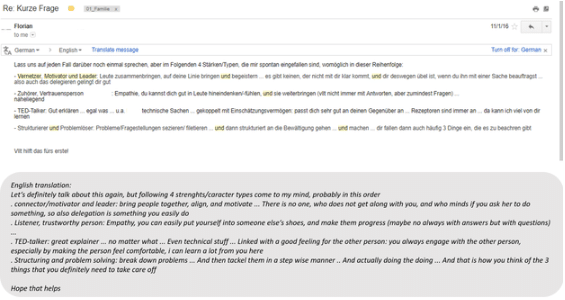04 Feb Your Strengths Are The Key For A Happy, Fullfilled, Successfull Career
This seemed really old school for us at first. Nothing new – “use your strengths, improve your weaknesses”, no-brainer. In fact, we use our strengths “anyway”, and we go to trainings, do development programs, and online courses to work on our weaknesses. Makes sense? No, not at all.
Even worse – you get this in an even worse version through the sandwich-feedback culture: “you have a beautiful pair of trousers, your analysis skills sucks, and you are a nice person.” Wonder why so many feedback talks focus only on one thing, your weaknesses?
Completely wrong approach, in fact: Screw working on your weaknesses. Only focus on your strengths. It took us some time to recognize that; much longer to really work that way. Don’t do the same mistake.
Because if you focus on your strengths, you are the 1% swimming against the stream. If you want to be outstanding, you have to stand out.
Knowing what you are good at, is one of the most important elements of getting work you really want. That is why this post is about 2 things
- Why your strengths are so important for your happiness, motivation, and success at work and
- Get you started on finding out what your strengths are
Interested? Then keep on reading – let’s get started, “why focus on strengths?”
Just don’t waste your time, applying what you are good at makes work fun and meaningful
Listen to this video of Gary Vaynerchuk at USC 2015, especially 4.30min. We recommend to listen to it all way through: “The number one thing you can do is bet on your strengths because it is the most effective use of your time … Don’t waste time to “check the boxes” of the things you are not good at, and then waste time and loose”.
The time you spend on your strength yields much higher returns. In an interview with Jony Ive and JJ Abrams, Jony Ive talks about how they refocused his role at Apple to eliminate managerial work. Around minute 34 he says the following: “The most valuable contribution I can make to Apple certainly isn’t my administrative prowess”.
Jony Ive is an incredible designer – let him design and bring in someone else to manage. Doing the opposite, would be a waste of time. And not only that: When we use our strengths, work becomes more meaningful for us , which is a huge booster of job satisfaction.
Your strengths are your true growth potential
 All feedback evaluation systems identify some kind of “areas for development”. Almost all of them focus on the wrong thing: weaknesses of a person.
All feedback evaluation systems identify some kind of “areas for development”. Almost all of them focus on the wrong thing: weaknesses of a person.
Our true “areas for development”, our “growth potential” are our strengths – sounds weird, but that’s how we are wired: Brain science reveals that we do learn and grow the most in our areas of strengths. We grow the most synapses in those areas of our brain where we have the most pre-existing synapses.
Easily said, from being a good presenter to become a great one is easier, than from being a ‘bad’ presenter to become a good one. And that is supported by studies, who found out that positive self-monitoring and strengths leveraging are particularly suited to circumstances when you’re learning something new, something difficult or something perceived as difficult.
Capital trumps courage. Your strengths are your source of success.
Cal Newport describes in his book “So good they cannot ignore you” that being in control and enjoying autonomy in  your work is a key ingredient for a successful career. The more career capital – meaning rare and valuable skills in your current job – you collect, the more likely you are going to make a great career. The more your strengths play into the valuable skills needed in a certain job, the better your starting position.
your work is a key ingredient for a successful career. The more career capital – meaning rare and valuable skills in your current job – you collect, the more likely you are going to make a great career. The more your strengths play into the valuable skills needed in a certain job, the better your starting position.
For example – when starting a blog, skills like writing interesting blogs, attracting readers, and monetizing the blog are important skills. Becoming a successful blogger is a much harder challenge for someone who does not have these skills compared to someone who has. The path to making a really great blog is much longer.
Therefore, we recommend the participants of our courses to have an honest look at what are the skills needed in your job to succeed and then compare, if they match your strengths. For example, we ask what makes people rockstars in their industry or position, what are the special skills they have, hence matter in what ‘one’ do in this role? And then, do these match with your strengths?
So, discover what you are good at
At work you want, at the beginning of our course, we encourage everyone to write down his or her strengths. Many people find this hard – some have never thought about it, some say “I am not really good at anything …”.
There is a simple way of getting a first idea of what you are good at. Ask 10 (the more the merrier, but get at least >8) close friends and family members about your strengths. I did exactly that, sorry, this is in German …, , but I guess you catch it …
What do you expect when asking people that question? Usually, many people will answer brief, not saying much. Never mind, don’t bother, they are probably busy. Instead, ask them if they want you to tell them their strengths. If they agree, do so, in a great length of detail. Then, ask them for yours again.
What happens? You will be surprised about what you will hear. And what you will learn about yourself. Again and again we love to hear from our course participants with what they come back – and especially how much they have learnt in the process. That is why we make your strengths an essential topic of our course … with much more exercises beyond the one mentioned above. Because it is a core pillar of work you want and helps you tremendously steering towards your objective.
I learnt a ton about myself during this exercise and in fact, I keep on going back to my list. And then ask myself – how can I make even more use of them today?
So, start creating that list of strengths for you today – go out, ask at least 3 friends to tell you what they think you are good at. Don’t wait, get started today, it is a pretty quick, simple email to write, isn’t it?
And then, come back and tell us below about what you found out – We are sure you’ll have something to say!
Also, check out our Online Tutorials and our 1:1 Mentoring to get you work you want. Major element of the first part of the course is getting clarity around what you are good at, there will be a lot of inspiration beyond this post.
If you enjoyed this post, we would be very grateful if you’d help it spread by emailing it to a friend, or sharing it on Twitter, LinkedIn or Facebook. Thank you!


No Comments